Last Updated on October 29, 2020
From its hypnotic opening dream sequence to the irresistible fascination of its title character, Daphne du Maurier’s Rebecca has captivated readers since its first publication in 1938. Like all great literary classics, it is a novel with the power to speak to new audiences and to adapt to changing times.
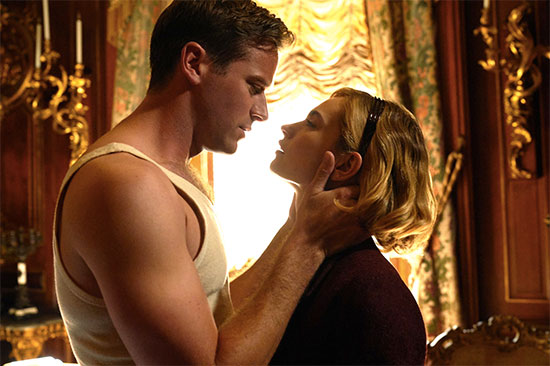
To help keep this site running: Willow and Thatch may receive a commission when you click on any of the links on our site and make a purchase after doing so.
Read through the lens of the #metoo movement when the novel celebrated its 80th anniversary in 2018, Du Maurier’s depiction of Maxim de Winter’s treatment not only of his first wife Rebecca but also the famously timid second Mrs de Winter took on a darker significance.
Netflix has returned to an even more modern Manderley in Ben Wheatley’s new adaptation of the novel, a version which deliberately set out to sidestep Alfred Hitchcock’s much-loved 1940 film to present a vibrant and dynamic Rebecca for the 21st century.
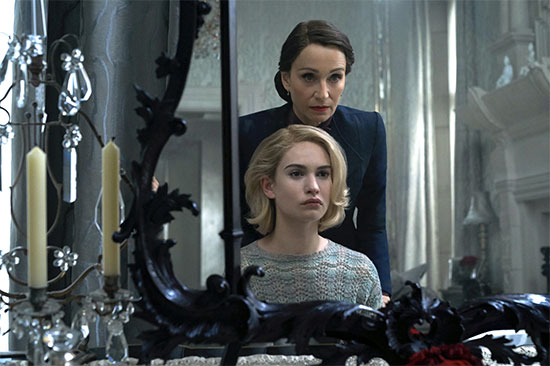
Purists will undoubtedly be eagle-eyed in spotting the divergences from Du Maurier’s plot, in particular the new fate imagined for sinister housekeeper Mrs Danvers (played by Kristen Scott Thomas) and the uncharacteristically optimistic final line from the second Mrs de Winter (Lily James). But there is much in this new adaptation that casts intriguing new light on Du Maurier’s bestseller.
Dreams and nightmares
A challenge facing any adaptation of Rebecca (and there have been two for television in addition to the Hitchcock classic) is how to recreate the perspective of the narrator, the second Mrs de Winter. It is her intense and febrile imagination which is so crucial to the atmosphere of the novel.
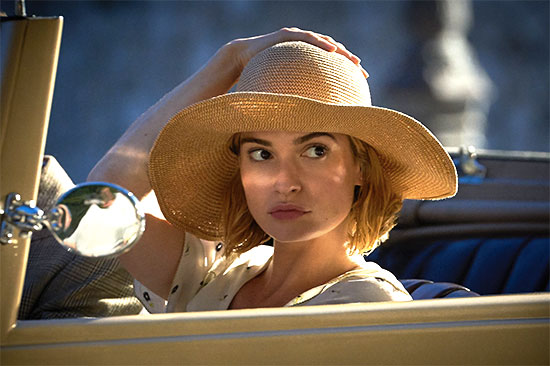
Visionary dreams bookend the novel and, as Sally Beauman writes in her afterword to the Virago Modern Classics edition, Mrs de Winter “daydreams incessantly.” It is in these vivid fantasies, as much as in the recollections of the devoted Mrs Danvers, that Rebecca comes to life.
The Netflix adaptation opens with Mrs de Winter’s dream of a dark-haired woman in red. This figure of Rebecca reappears throughout the film, disappearing down the corridors of Manderley during the masquerade ball and embodying Mrs Danvers’ conviction that her mistress is “still here” in the house.
As she is about to leave Monte Carlo for Manderley, taunted by Mrs Van Hopper that both Maxim and Manderley are haunted by Rebecca, Lily James’s Mrs de Winter petulantly declares: “I don’t believe in ghosts.” But in this adaptation, Rebecca’s presence feels more tangible than spectral (although in a nod to Du Maurier’s famous short story The Birds, on more than one occasion an ominous murmuration of birds hangs in the sky).
Rebecca’s red dress in the opening dream becomes more significant when we discover that the dress from the painting of Caroline de Winter, Maxim’s ancestor, is also a deep red velvet (inspired by John Singer Sargent’s painting of Mrs Hugh Hammersley).
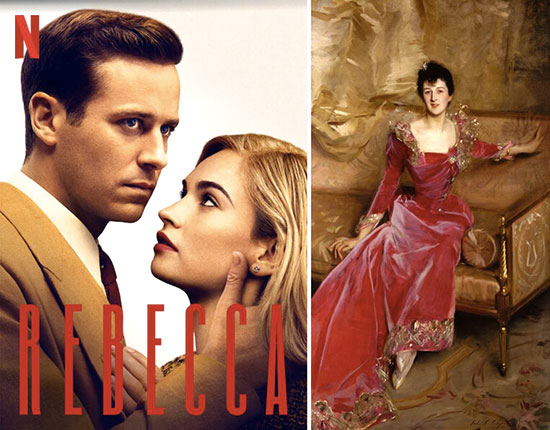
The dream thus prefigures Mrs de Winter’s own unwitting impersonation of Rebecca, a visually effective doubling that recalls Du Maurier’s splitting of her own personality in her novel’s two central characters.
Du Maurier began writing the novel in Egypt where she had accompanied her husband on a military posting, and her fear of her social inadequacy as a commanding officer’s wife bubbles up in the second Mrs de Winter. But underneath this reticence, Du Maurier’s independent, creative self fuelled the passionate and fearless Rebecca de Winter, a character who both inspires and intimidates in the novel.
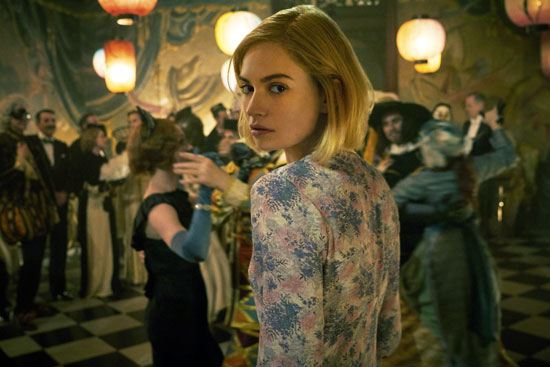
In another added dream sequence in the new adaptation, Armie Hammer’s Maxim is sleepwalking towards the west wing of the house (a symbol of his lingering guilt over Rebecca’s death) and James’ Mrs de Winter is engulfed by ivy that crawls along the hallway, an image that brings the monstrous natural growth from the novel’s opening dream into Manderley itself.
When the novel’s Mrs de Winter tries to recapture her lost Manderley, she dreams that “nature had come into her own again and, little by little, in her stealthy insidious way had encroached upon the drive with long tenacious fingers.” In the new adaptation this insidious menace finds its way into the house but James’ character does not remain imprisoned by her dreams and fantasies for long; she emerges as a strong and independent woman, with more than a dash of Rebecca’s boldness.
‘I can see the woman I am now’
Mrs de Winter is such an effective narrator in Du Maurier’s novel that we are easily persuaded of her own poor estimation of herself. We empathise with her shyness, her anxiety, her impostor syndrome. But Du Maurier hints that she is more powerful than she at first appears and this boldness is a quality that the new adaptation embraces. In a recent interview, James said that she wanted to play Mrs de Winter as “less of a damsel in distress.”
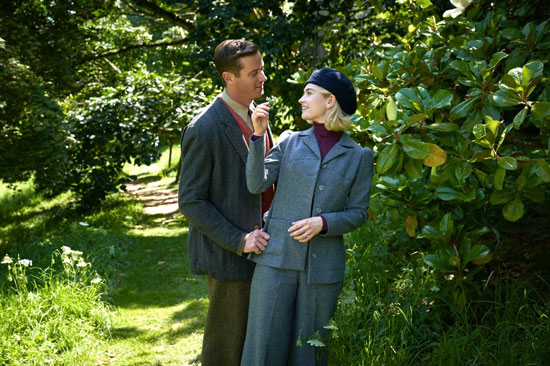
It is Mrs de Winter who firmly takes charge once Maxim has made his confession. Rebecca “hasn’t won, we won’t let her” she asserts – and from then on control of the events seem firmly in her hands rather than Maxim’s, especially when he is remanded in custody and she races down to London to discover the truth about Rebecca’s visit to the doctors.
This bolder Mrs de Winter leaves Armie Hammer’s Maxim somewhat in the shadows, despite his temper and repressed violence erupting in the confession scene. In the original novel, the narrator asserts herself by declaring: “I am Mrs de Winter now” and the new Netflix adaptation feels very much like Mrs de Winter’s film. Her final confrontation with a desperate Mrs Danvers, whose deep love for Rebecca is a palpable and poignant presence throughout, shows how important female relationships and women’s power is to this novel.
In exile after the events at Manderley, du Maurier’s Mrs de Winter muses that “confidence is a quality I prize, although it has come to me a little late in the day.” In this new adaptation, emerging from the shadows of her predecessor and the constraints of her husband’s control, Mrs de Winter finally has her day.
Dr Laura Varnam is a Lecturer in English Literature at University College, Oxford, and she is currently writing a book on Daphne du Maurier. You can read Dr Laura Varnam’s analysis of Hitchcock’s Rebecca on the Daphne du Maurier website and you can find out more about her work on her website. Her interview with Five Books about Rebecca is here. You can also find her @lauravarnam on Twitter. Rebecca: Netflix returns to Manderley with a modern remake of Daphne du Maurier’s classic thriller originally appeared on The Conversation.
If you enjoyed this post, wander over to The Period Films List. You’ll may also want see How Netflix’s Rebecca Can Be Killer.
![]()

